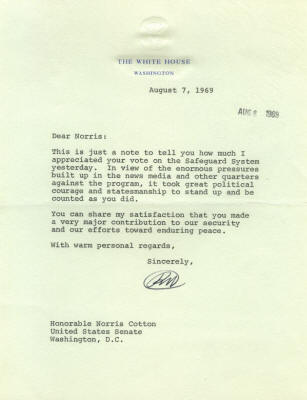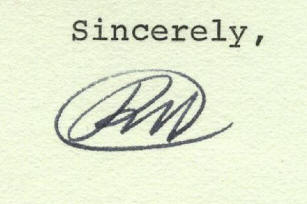702202
Richard M. Nixon
Click on image for larger size
Richard Milhous Nixon, 1913-1994. 37th President of the United States. Typed Letter Signed, RN, one page, quarto, on engraved, blind embossed stationery of The White House, Washington [D.C.], August 7, 1969. With original envelope.
This is an excellent content letter relating to the nuclear arms race and the United States' relationship with the Soviet Union at the height of the Cold War. Nixon thanks New Hampshire Senator Norris Cotton (1900-1989), a fellow Republican, for voting to support his controversial proposed Safeguard antiballistic missile system, which the Senate had approved by a single vote. He writes: “This is just a note to tell you how much I appreciated your vote on the Safeguard System yesterday. In view of the enormous pressures built up in the news media and other quarters against the program, it took great political courage and statesmanship to stand up and be counted as you did. / You can share my satisfaction that you made a very important contribution to our security and our efforts toward enduring peace.”
When Nixon took office in 1969, the United States was locked in the Cold War against the Soviet Union. Both countries had enough nuclear missiles aimed at the other to assure mutual destruction in the event of nuclear war.
Nixon abandoned President Lyndon B. Johnson's Sentinel antiballistic missile system in favor of the more limited Safeguard system. As originally envisioned, Sentinel was a comprehensive defense system designed to protect both the American civilian population and the United States' nuclear missile arsenal. Safeguard, however, was limited. It involved deploying short- and long-range antiballistic missiles at up to 12 sites in order to defend only critical Minuteman intercontinental ballistic missile sites, Strategic Air Command bases, and the National Command Authority in Washington, D.C. It thus gave the general public little protection, and in only a few areas. By proposing a program of this sort—too little to defeat a major attack—Nixon hoped to signal the Soviets that the United States sought only to protect its deterrent forces.
But many experts believed that developing and deploying antiballistic missiles would further accelerate the nuclear arms race and destabilize the relationship between the United States and Soviet Union. Proponents argued that the system would protect enough American antiballistic missiles to allow the United States to retaliate in the event of a Soviet missile attack. Secretary of Defense Melvin Laird insisted that Safeguard was the "minimal step necessary at this time to ensure the security of the American people" because the Soviets would have an estimated 2,500 long-range missiles by 1975 while the United States had only 1,054 and had no more planned for the next five years.
Despite the Administration's insistence, Congressional debate and votes throughout the summer of 1969 threatened to cancel the whole ballistic missile defense program. Nixon faced defections from Republicans as well as opposition from Democrats, and it looked as though he might suffer a major defeat in the Senate. Time magazine reported in May 1969 that the Administration was "embarrassed by lagging support in Congress and in the country," including opposition from "half of the normally loyal freshman Republican Senators.”
On August 6, 1969, the United States Senate approved the Phase I deployment of the system by only one vote. The Senators split, and Vice President Spiro Agnew broke the tie in favor of the Administration. It was on the heels of that vote that Nixon wrote this letter.
This letter makes it clear that Nixon, the cold warrior, believed in peace through strength. Rather than abandon the antiballistic missile program, he saw approval of the Safeguard system as "a very important contribution to . . . our efforts toward enduring peace." His views remained constant. Sixteen years later, in No More Vietnams, Nixon wrote that in Vietnam, the United States "tried and failed in a just cause. ‘No more Vietnams’ can mean that we will not try again. It should mean that we will not fail again."
Nixon has signed this letter with his initials, which is typical of his White House correspondence, in black fountain pen. The letter is in very fine condition. It would grade extra fine were it not for a fold in the center, which does not affect the signature, and a date stamp showing that Senator Cotton received it the day after it was typed. The envelope is opened at the top and overall is in very fine condition as well.
Unframed.
_____________
This item has been sold, but
click here to see other
Presidents and First Ladies items
that we are offering.
|





